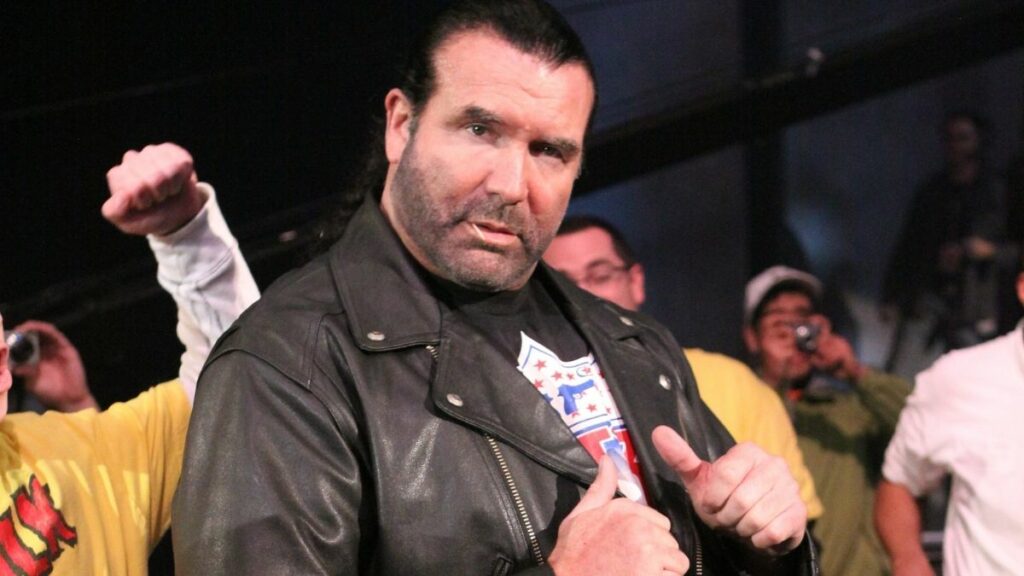When I first heard that Scott Hall was going to be the subject of a WWE-produced A&E Biography, I immediately thought back to the excellent 2011 E:60 documentary that aired on ESPN about him. That doc was so great, so heartbreaking, it was interesting to see what could be added, other than his death in March 2022. As the subject material is similar, the presentation and response of what came after the E:60 piece is what is appreciated for me.
Thirteen years later, and Ben Houser, who did the Scott Hall doc — and talked to SlamWrestling about it — is now an executive with WWE working on these docs and all of the company’s related film material. His vision is evident with the second piece on Scott Hall.

Ben Houser
The feature opens with an interesting note stating that an unreleased interview was filmed with Scott back in 2014. This would be the basis for the episode and has not been seen on television until now. Though it isn’t credited, let’s make the fair assumption that Houser had this in the can. It was worth the wait.
Hall’s life is detailed — growing up, hearing from his mother and brothers, and then the life-altering accidental murder Scott was involved with when dating a woman who worked at a strip club that he was a bouncer at. Multiple interviewees are shown briefly saying although this was such a traumatic event for Hall, he never talked about it to anyone besides when it happened, including his family. To me, this is highlighted as a key moment as it is also mentioned he avoided counseling for the incident and essentially kept it bottled up, which could typically lead to future issues that are touched on.
Once we get introduced to Hall as a wrestler, it is around this time he meets and marries his ex-wife. Diamond Dallas Page is the gateway for Scott Hall to get truly broken into the business, which is an interesting touch for anyone who knows what is to come for Hall, it seems DDP was always a constant in Scott’s life, whether he is in a positive or negative place.
Scott is introduced to Kevin Nash in 1991, and they began to work and travel together. WCW was not using Scott in a way that would have been useful and he knew it. Hall was soon connected to Vince McMahon around the time his contract was up and was looking to get a deal signed in a pivotal moment leading to the Scarface inspired Razor Ramon.
Once the Razor character was born, Scott used it to make it his own, starting from stealing lines straight out of Scarface. McMahon would leave tapings and meetings to help direct the Razor vignettes, proving how high he was on the character. McMahon is directly mentioned a couple times by now, which he is a big part of Scott’s story, particularly in the Razor era, even with early behind the scenes footage of the two, an interesting note amid the current circumstances regarding McMahon and his status in WWE, recently being blurred from certain cutscenes in the WWE 2K24 video game, a seemingly last-minute decision.
At this point, Scott is being pushed heavily in the midcard. The Razor character has become hugely popular among the fans and with McMahon himself. A random match on RAW was featured, Razor Ramon vs 1-2-3 Kid, and this is where things would change for Sean Waltman, another close friend of Scott for years to come. Waltman recalls the funny moment of Scott appearing on Jerry Springer and giving away the real Intercontinental Championship belt to a young fan and having to call WWE to make sure they had a spare.
One of the most infamous moments in Hall’s career, the WrestleMania 10 ladder match with Shawn Michaels is highlighted along with the formation of the Kliq, sadly it would also be around this time that drugs would be introduced to Scott and would begin a domino effect for what was to come.
Scott compares Razor’s life to Scott’s life and how great Razor’s was compared to Scott’s once the lights were dimmed and the cameras were off. Drinking quickly became a problem for Scott, starting as a “only on the road” occasion, realization set in for the Kiiq that they were always on the road. Scott’s wife details that Razor started to appear even at home, when he was not on the road in front of the flashing lights. Just a heartbreaking moment, when Hall’s family, including his son and daughter, recalls where alcoholism began to takeover, Scott began to mirror his father and the alcoholic he would become, something he vowed to never be. Hall’s life was going downhill, and it is hard to watch his family around him detail the man he was starting to become, accompanied by home footage.
May 19, 1996 was Scott’s last match in WWF and the jump back WCW would be made and would change his life forever. It was the start of something new, fresh, with the beginning of the NWO, which grew to include Nash, Hulk Hogan, Sean Waltman and so many more. (The NWO itself was a Biography subject last season.) The NWO became culturally hip.
Along with the fame once again came the influences around Hall, something that happened with the rise of Razor and now returned heavily with the height of the NWO. Hall details the trouble of drinking was still around but now pills came into play. Not only were they hurting Hall personally, but they took a toll on his career as he was showing up under the influence and was clearly not in the right headspace to work effectively at such a high level.
Scott under the influence was “haunted” person said Paul Levesque. Eric Bischoff told a story that proved Hall’s trauma with the strip club murder earlier in his life would consistently linger on his mind and haunt him and trigger a PTSD like event for him whenever alcohol was involved.
Hall would get a shot at redemption as he got the call to return to WWE in 2002 for the NWO invasion, despite several arrests related to his alcoholism. Once again, he was given another chance at fame, at the top of the card with his friends, but the addiction was too much and overtook him. He would be released from WWE, more arrests, car accidents, suicide attempts, and embarrassing independent appearances would follow as fans were witnessing in real time the downfall of one of the most known pro wrestlers ever. Just a tough watch during this segment watching a broken man truly at rock bottom.
Diamond Dallas Page, Brian Blair and Scott Hall at the Cauliflower Alley Club banquet in Las Vegas in 2015.
The ESPN: E:60 piece provided a behind-the-scenes look at how it came together and why it came together. In a wild turn of events, Waltman gets a call from Hall saying he was planning to commit suicide, and immediately calls DDP who had just happened to be filming a documentary with Jake Roberts, another recovering addict. Hall would stay with DDP for several months, a revitalization of his career and his life. Soon enough, he was in a much better place and could even be presented in a healthy manner, getting his induction into the WWE Hall of Fame as one of the most memorable moments in WWE history.
Hall finally was able to be at the top of his profession in a different way, as a legend, but for once without an addiction to distract him and prevent him from success and happiness at the same time. Unfortunately, it wouldn’t last long, and even his peers knew his days were numbered following another incident involving pills and alcohol the day before the 2021 WWE Hall Of Fame.
As the documentary ends, the heartbreaking details of Hall’s death comes from his daughter, as she was the last to see him in the hospital following a fall he had in his home. Teary eyes fill multiple interviewees, specifically the Kliq members, as they recall getting the news. Levesque delivers one of the most devastating lines, stating that it was a call he was preparing for but didn’t expect — and want — to get for years to come.
This Biography proved that Scott Hall lived an exciting, captivating, and a very real life. Despite all the pain and heartache to himself and others, he remains one of the top performers ever and worthy of a second great documentary.
RELATED LINKS
- Scott Hall story archive
- Slam Wrestling’s WWE on A&E archive
